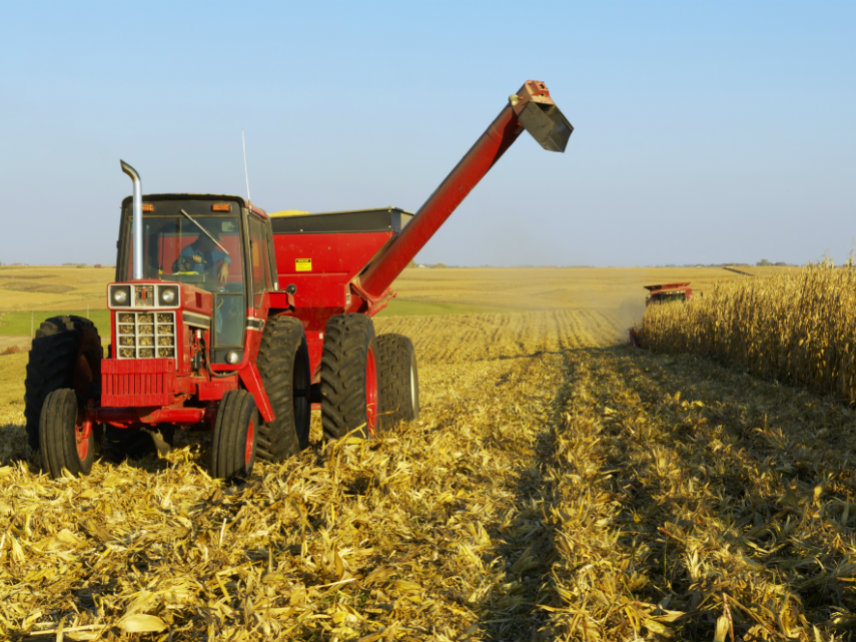Trump Says He's 'Delivering' for Farmers. His Steel Tariff Says Otherwise
"There's not a day on the farm when a farmer doesn't touch steel," says Rep. David Young. And all that steel is about to get more expensive.
Tuesday was National Agriculture Day, and President Donald Trump was on it:
Our Nation was founded by farmers. Our independence was won by farmers. And our continent was tamed by farmers. Our farmers always lead the way -- we are PROUD of them, and we are DELIVERING for them! #NationalAgricultureDay
— Donald J. Trump (@realDonaldTrump) March 20, 2018
But while Trump talks about "delivering for" American farmers, the most significant economic policy to come out of the White House so far this year stands to hurt farmers—and businesses dependent on farming—more than many other sectors of the economy. Trump's 25 percent tariff on imported steel will increase the cost of farming equipment and cut into farmers' bottom lines, and the tariff might trigger a trade war that could cut off American exports to Europe and China.

"There's not a day on the farm when a farmer doesn't touch steel," Rep. David Young (R-Iowa) told Treasury Secretary Steve Mnuchin during a House Appropriations Committee hearing earlier this month. "The agriculture industry is worried about these tariffs on aluminum and steel."
Young joined the rest of Iowa's congresssional delegation in sending a letter to the White House earlier this month urging Trump to reconsider the tariff "given the consequences this will have on states like Iowa, rural communities throughout the nation, and on America's farms."
While Iowa is best known for its farms (and its caucuses), the state's manufacturing industry is also worried about the potential consequences of tariffs. More than 3,000 factories are scattered across the state, according to the Des Moines Register, and many of them make the equipment used on farms in Iowa and across the Midwest. Steve Sukup, CFO of Sukup Manufacturing, which employs about 600 Iowans to make steel grain bins and dryers, tells the Register that tariffs are "a step backward" after tax and regulatory reforms helped businesses like his.
Agriculture industries are hardly alone in fearing Trump's tariffs. Artificially inflating the price of imported steel will hurt businesses across a wide swath of the economy. According to 2015 Census data, steel mills employed about 140,000 Americans and added about $36 billion to the economy that year, but steel-consuming industries employed more than 6.5 million Americans and added $1 trillion to the economy. In other words, for every steel-producing job in the country that might benefit from Trump's proposed tariffs, 46 steel-consuming jobs are put at risk. Everything from cars to housing will be affected. According to a policy brief released by the Trade Partnership, a Washington-based pro-trade think tank, Trump's tariffs will wipe out about 179,000 jobs.
Farmers and lawmakers from farming states are particularly worried about the prospect of retaliatory tariffs being imposed by Europe, China, and others targeted by Trump's steel and aluminum levies. American agricultural products would be an easy target for retaliation, because America has a large trade surplus with many other nations. For example, 60 percent of the soybeans grown in Iowa end up being shipped to China.
"Strong, fair trade favors American families and businesses," the Iowa lawmakers wrote in their letter to the White House, "and allows them to export their goods, which is critical for the farmers, manufacturers, and insurers in our state."
Soybean exports were already in a precarious state, according to Peter Meyer, senior director of agricultural analytics at S&P Global Platts, which advises investors about commodity markets. Writing at The Hill, he warns that fewer exports to China would wreak havoc on American farmers.
"The fragile U.S. economy cannot afford a trade war with China," he says. "No one should legitimately believe that political promises made in one area will not have an effect in another."
Trump seems to think so. Trade wars are "good, and easy to win," the president infamously tweeted shortly before launching his steel tariffs. In the factories and fields of Iowa, that feeling is not shared.
"There hasn't been a trade war we've won," Sukup tells the Register. "And we have the most to lose from it."


Show Comments (21)